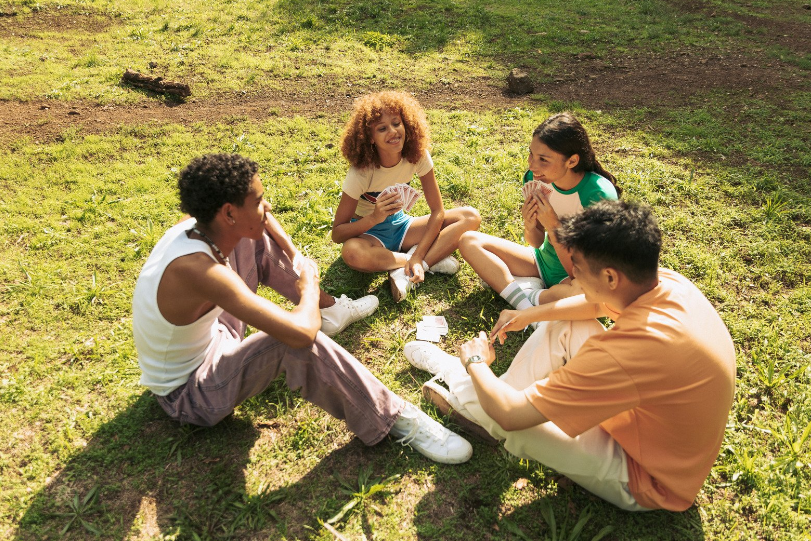How can you improve your teenage social life? Your teenage years are the best time to live. That’s when you start knowing the reality of the world and start pursuing your goals to be the person you always want to be.
It’s always important to know how to deal with your problems, emotions, and the people around you at your age, because that’s the type of person you are going to be.
In this article, we will guide you on how to improve your teenage social life and how to communicate with others in the way you like it the most.
Adolescence is a critical phase in a person’s life, marked by numerous physical, emotional, and social changes. It’s a time when teenagers begin to explore their identities, form connections, and build friendships. However, for some teenagers, improving their social life can be challenging.
Teenagers lacking social skills, for example, my teenage daughter has no social life, you should ask her what the problem is and try to understand why she doesn’t want to socialize. Encourage her to go out and advise her how to select the best friends for her type.
The Social Life of Teenagers

Teenagers are often confronted with peer pressure, self-doubt, and a desire to fit in. As parents, it’s crucial to understand the dynamics of their social lives. Adolescents typically engage in various social activities, such as school, sports, hobbies, and online interactions. While some teenagers thrive in these environments, others may struggle to establish meaningful relationships or even face social isolation.
In the exciting and sometimes challenging journey of teenage life, enhancing your social experience is a key ingredient for personal growth and happiness. Building strong relationships and connections with others is not just about popularity but about forging meaningful bonds that can last a lifetime.
Essential tips to help you navigate and elevate your teenage social life
- First and foremost, cherish the moments spent with family and friends. These are the people who know you best and can offer unwavering support and love. Investing quality time in these relationships can provide a solid foundation for your social well-being.
- While existing friendships are precious, don’t hesitate to branch out and make new friends. Every friendship is an opportunity to learn, grow, and discover new perspectives. So, step out of your comfort zone, strike up conversations, and be open to meeting people from different walks of life.
- Crucially, always remember that you deserve to be valued, respected, and, above all, safe in every social interaction. Trust your instincts and prioritize your well-being, both online and in person. Guard your personal information online like a treasure, as your digital presence should reflect your boundaries and values.
- In a world where bullying and feeling unsafe still persist, don’t suffer in silence. Reach out for help if you find yourself in distress. Whether it’s facing a bully or dealing with online harassment, speaking up is a courageous act, and there are trusted individuals, such as health workers, family members, and friends, who are ready to support you.
- Lastly, be in tune with your emotions. Adolescence can be a rollercoaster of feelings, from worry to sadness. Don’t bottle up your emotions; instead, confide in those you trust.
Parental Role in the Social Life of Teenagers

Social skills activities for teens to have. Parents play a significant role in shaping their teenager’s social life. Here are some ways you can support your child’s social development:
1. Open Communication
Maintain open and non-judgmental communication with your teenager. Create a safe space for them to express their thoughts, feelings, and concerns about their social experiences.
2. Encourage extracurricular activities.
Encourage your teenager to participate in extracurricular activities that interest them. Whether it’s joining a sports team, a club, or pursuing a hobby, these activities provide opportunities to meet like-minded peers.
3. Set realistic expectations.
Recognize that every teenager’s social journey is unique. Avoid comparing your child to others, and instead, focus on their individual growth and progress.
Having a Healthy Social Life in Adolescence and Youth
A healthy social life is essential for a teenager’s emotional and psychological well-being. Here’s why it matters and how you can think about it in your mind:
1. Building self-esteem
Positive social interactions boost self-esteem and help teenagers develop a sense of self-worth.
- Positive Self-Talk: I can work on my self-esteem by changing the way I talk to myself. Instead of saying, “I can’t do this,” I’ll try saying, “I’ll give it my best shot.” It feels better to be my own cheerleader.
- Setting Achievable Goals: I’ll start setting small goals for myself and celebrate when I achieve them, no matter how little they seem. It’s a way to prove to myself that I can do things and feel proud of them.
- Pursuing Interests: I’m going to dive into the things I love. Whether it’s painting, playing guitar, or sports, getting better at something I’m passionate about makes me feel more confident.
2. Developing empathy
Socializing teaches empathy and the ability to understand others’ feelings and perspectives.
- Active Listening: I’ve learned that when someone talks to me, I should really listen. Instead of just waiting for my turn to speak, I’ll ask questions and show I care about how they feel. It’s a great way to connect with others.
- Empathy Exercises: I can practice empathy by thinking about how others might be feeling in different situations. For example, when my friend is upset, I’ll ask myself, “How do they feel right now? Why?” It helps me understand their perspective better.
- Volunteer Work: I’ve started volunteering at a local shelter, and it’s opened my eyes to different people’s struggles. It’s making me a more empathetic person as I get to know their stories and experiences.
3. Building Resilience
Facing social challenges and learning to navigate them builds resilience, a valuable life skill.
- Problem-Solving Skills: I’m working on my problem-solving skills by breaking down issues into smaller parts and thinking of solutions. It’s helping me feel more in control when I face challenges.
- Stress Management: When I feel stressed, I’ve started taking deep breaths or practicing some quick meditation exercises. It’s a way to calm my mind and stay focused when things get tough.
- Learning from Failure: I’ve learned that it’s okay to fail sometimes. Instead of getting discouraged, I try to see failures as opportunities to learn and grow. Each setback teaches me something new.
Parenting Tips for Improving Your Teen’s Social Life
To enhance your teenager’s social life, consider the following tips:
1. Be a role model.
Demonstrate healthy social interactions in your own life. Your actions speak louder than words.
2. Teach social skills.
Provide guidance on basic social skills like active listening, maintaining eye contact, and starting conversations.
3. Encourage friendships.
Support your teenager in forming friendships by facilitating playdates or outings with peers.
Ways to Improve Your Child’s Social Skills
Improving your child’s social skills is a gradual process. Here are some effective strategies:
1. Social Skills Activities
Engage your teenager in social skills activities that are both fun and educational. Role-playing, group discussions, and team-building exercises can be beneficial.
2. Therapy and counseling
Consider seeking professional help if your teenager faces severe social challenges. Therapists and counselors can provide valuable guidance and support.
3. Foster Independence
Encourage your teenager to make decisions and solve social problems independently. This builds confidence and self-reliance.
Top 25 Social Skills Activities for Teens and Young Children

Social skills activities for teens to learn here are our top 25 picks:
- Role-playing scenarios to practice social interactions.
- Group outings to parks or recreational areas
- Volunteering for community service together
- Joining a drama or theater club.
- Attending workshops on communication and social skills.
- Playing team sports like soccer or basketball.
- Organizing themed parties or get-togethers.
- Participating in debate clubs or public speaking classes
- Collaborating on art or creative projects
- Cooking or baking as a group.
- Visiting museums or art exhibitions
- Learning a musical instrument together.
- Going on hikes or nature walks.
- Taking dance or martial arts classes.
- Attending self-improvement seminars.
- Exploring new hobbies and interests.
- Joining book clubs or reading groups.
- Volunteering at animal shelters or charities
- Learning a new language as a team.
- Participating in community gardening.
- Practicing mindfulness and meditation
- Attending cultural festivals and events.
- Engaging in outdoor adventure activities.
- Building DIY projects as a group
- Traveling and exploring new places.
The Way Your Teenager Likes to Socialize
Every teenager is unique, and their social preferences vary. Some may enjoy large gatherings, while others prefer one-on-one interactions. It’s essential to understand your teenager’s social style and support them accordingly.
So if you feel alienated, don’t worry; the secret you will realize one day is that everyone feels that way.
You may face a situation like my teenage son has no social life, and that has a lot of reason one of these days boys like to spend time on Instagram and video games rather than communicate and have real-life relationships.
It’s just that people want to cover it up and fit in. So they try to be something that they’re not. They try to be cool, and they become friends with people who they sometimes shouldn’t become friends with.
They form fake friendships, which don’t last and don’t mean anything if you’re not in high school. The people around you might look happy, but they’re not as happy as you think they are, and you’re not as alone or weird as you think you are.
But if you get involved, you can make some real friends and learn things about yourself.
How to Improve Your Teenage Social Life: Conclusion
In conclusion to our guide on how to improve your teenage social life, improving your teenager’s social life is a crucial aspect of their development. Focus on building your future and what kind of person you want to be; every small step you take in your teen life will be big in the future.
So stay strong, and you can have the best life by following our guide. Be safe, be strong, and be happy.
FAQs About How to Improve Your Teenage Social Life
What should a 16-year-old be doing in life?
A 16-year-old should focus on personal growth, academics, extracurricular activities, and building social connections. It's a time of self-discovery and preparation for the future.
How can I improve my child's social skills?
You can improve your child's social skills by encouraging social activities, practicing active listening, and providing opportunities for them to interact with peers.
What do you do when your kid is left out?
When your child is being left out, talk to them about their feelings, offer support, and help them find ways to connect with others through shared interests and activities.
What social skills does a teenager with autism spectrum disorder need to know?
Teenagers with autism spectrum disorder may benefit from learning social skills such as reading facial expressions, understanding personal boundaries, and managing sensory sensitivities.

